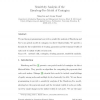1204 search results - page 47 / 241 » Termination of Polynomial Programs |
SAS
2004
Springer
15 years 6 months ago
2004
Springer
We describe a polynomial-time algorithm for global value numbering, which is the problem of discovering equivalences among program sub-expressions. We treat all conditionals as non...
98
Voted
SLP
1993
15 years 2 months ago
1993
We try to assess to what extent declarative programming can be realized in Prolog and which aspects of correctness of Prolog programs can be dealt with by means of declarative int...
ORL
2010
14 years 11 months ago
2010
We use linear programming to provide a sensitivity analysis of Eisenberg and Noe’s one-period model of contagion via direct bilateral links. We provide a formula for the sensiti...
103
Voted
SAS
2004
Springer
15 years 6 months ago
2004
Springer
Termination has been a subject of intensive research in the logic programming community for the last two decades. Most works deal with proving universal left termination of a given...
99
Voted
STOC
1991
ACM
15 years 4 months ago
1991
ACM
The study of self-testing/correcting programs was introduced in [8] in order to allow one to use program P to compute function f without trusting that P works correctly. A self-te...

